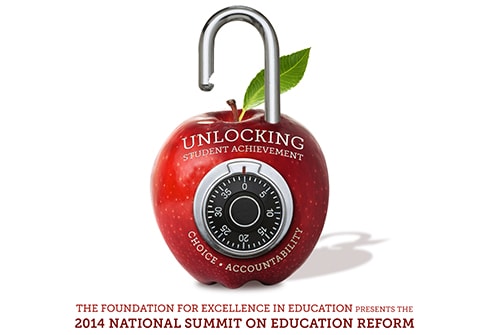10 Lessons from the National Summit on EdReform

Opening the Foundation for Excellence in Education’s National Summit on Education Reform (#EIE14) former Florida governor Jeb Bush (@JebBush) said fixing our schools is among the most urgent national priorities. While at #EIE14 this week in DC we highlighted 10 lessons learned in keynotes, breakout sessions and hallway conversations.
“The challenge of fixing our schools must be among the most urgent of national priorities.” @JebBush #EIE14
— ExcelinEd (@ExcelinEd) November 20, 2014
1. High expectations for all. Andreas Schleiger, OECD (@SchleicherEDU) said it’s a, “False choice between excellence and equity.” He noted that top performing countries hold high expectations for every student–universal standards and a belief that all children can succeed.
Gov. Bush said, “There is no question we need higher academic standards and – at the local level – diverse high-quality content and curricula.” He added, “the rigor of the Common Core State Standards must be the new minimum in classrooms,” and “For those states choosing a path other than Common Core, I say this: Aim even higher…be bolder…raise standards and ask more of our students and the system.”
“Our research shows us that there is no policy trade off between excellence and equity” @SchleicherEDU #EIE14
— Dale Chu (@Dale_Chu) November 21, 2014
@SchleicherEDU US is a great exporter of education innovation; need to implement our own innovations w/ greater fidelity. #EIE14
— Brian Dassler (@brian_dassler) November 21, 2014
Amanda Ripley (@AmandaRipley), author of The Smartest Kids in the World, said the signals we send about priorities matter, “kids are very astute at reading the signals” about what we value. She noted that top performing countries all have shared high expectations and they test kids on regular intervals.
2. Teachers matters. Schleiger noted the importance of well prepared teachers–a factor more important than length of day or class size. He noted that quality teaching happens in systems with good preparation, pay, and ongoing feedback–societies where teaching is valued and recognized. Ripley said top performing countries make teacher preparation programs highly selective.
The secret is really strong leaders and great teachers. @RSD_LA Supt. Dobard #EIE14 @ExcelinEd
— JC Considine (@ConsidineJC) November 21, 2014
3. Teaching as science. “Singapore has moved teaching from an art to a science,” said Schleiger. In addition to recruiting top talent into schools, Schleiger noted that pedagogy matters–countries that focus on conceptual understanding perform better on quality tests like PISA.
Andy Malone, Harlem Success Academy, said teachers benefit from weekly planning meetings to review content to ensure deep understanding. It’s “real time coaching–in the moment leadership” that makes a big difference in schools.
4. Leadership matters. Introducing former NYC chancellor Joel Klein, Louisiana chief John White noted the amazing legacy of leaders that worked with Joel that lead (or led) education in cities including Newark, Camden, New Haven, Detroit, Chicago, and Washington DC, and chiefs in Connecticut, New Jersey, and Louisiana. Good leaders develop leadership.
Malone said leaders need the ability to communicate a vision to their community in a simple and clear way. The mission and vision clarity Malone recommends stands in contrast, according to Riley, to a lack of outcome focus common in the US.
John White noted legacy of #Edleaders that worked for @JoelKlein: supts in 6 major cities & 3 states #EIE14
— Tom Vander Ark (@tvanderark) November 20, 2014
Right on @CondoleezzaRice for acknowledging the role of the school principal as a powerful change agent! #edleaders #EIE14
— Carri Schneider (@CarriSchneider) November 21, 2014
Malone: “Any dream in schools is only as good as it is managed.” #edleadership is critical to #edreform#EIE14
— RiShawn Biddle (@dropoutnation) November 21, 2014
5. Technology expands options. “Digital technology expands choices and makes learning personalized, said Gov Bush. He noted that “Any of us can take a class taught by the most impressive minds on the planet,’ and added, “Blended learning helps us reach every child.”
Digital Learning and #CourseAccess expands choices and makes learning personalized. #EIE14 http://t.co/FQk0ig7Rew
— ExcelinEd (@ExcelinEd) November 20, 2014
#BlendedLearning helps us reach very child @JebBush #EIE14
— Tom Vander Ark (@tvanderark) November 20, 2014
John Bailey, ExcelinEd, described the benefits of Course Access, a catalog of high quality online learning courses from multiple providers vetted by states.
6. Community + options. “The number one way to get a parent involved in a child’s education is to give them a choice,” said Klein. “Parents are the force multiplier for great educators,” said Amanda Ripley.
Great countries and schools use parents as force multipliers for teaching kids @amandaripley #EIE14 @AZChamber
— Lisa Graham Keegan (@LisaGK) November 21, 2014
.@joellklein says the best way to get parents involved in their student’s education is to give them choice. #EIE14 — Moriah Costa (@MoriahCosta) November 20, 2014
.@RSD_LA Supt. Dobard — 3 core principles are autonomy for school leaders, accountability, community. #EIE14 @ExcelinEd — JC Considine (@ConsidineJC) November 21, 2014
Schleiger said that countries that grant school level curriculum autonomy over curriculum tend to perform better in math but when it’s in the context of high expectations and rigorous teacher development.
7. Invest in outcomes. Schleiger noted little correlation between spending and educational outcomes. Checker Finn moderated a conversation about getting a bigger bang for the buck. As outlined in Funding Students, Options and Achievement, Tom described how school funding should be weighted, portable, flexible, and performance-based.
Amanda Ripley described the rapid rise of Polish K-12 achievement–while spending about half of what we do in the US. Schleiger said what is important is effective spending choices– the alignment of resources with key challenges. For example, Finland has highly equitable spending and encourages better teachers to work in struggling schools.
Utah representative Greg Hughes described the use of social impact bonds to fund early learning interventions and noted that they could also be used in dropout prevention and juvenile justice. Investor returns are created through savings in future service provision.
Paying for performance session, spending education dollars wisely to help increase student achievement pic.twitter.com/FmrkCWQsNx
— ExcelinEd (@ExcelinEd) November 20, 2014
8. Coherent policy. Schleiger said it’s not one policy, it’s the “coherence of policy and practice that makes success possible for all children.”
Throughout the sessions and keynotes, there was a consistent through-line of the role of policy and policymakers as enablers or inhibitors to education reform. It’s one reason why our team hosted a “policy hackathon” before the main event to engage policymakers in exploring specifics related to the ideas that they’d explore the rest of the week.
Pre- #EIE14 Experience: Blended D.C. Policy Hackathon – http://t.co/NdMVq7JaKx via @CarriSchneider and @tvanderark
— Digital Learning Now (@DigLearningNow) November 20, 2014
9. Encourage innovation. “Given the potential for personalization, innovation should be the driving force in education,” said former NYC Chancellor Joel Klein. His leadership formula, “empower your people, hold them to account–you can only unleash greatness, not command and control it.”
Tom discussed 10 Ways States Can Use Prizes & Pull Mechanisms to Innovate noting that states can’t mandate innovation but they can create space and incentives for new school models.
@JoelIKlein finds Most frustrating thing in K12 is culture of proving what’s wrong with innovations rather than seeing what works #EIE14
— Marie Bjerede (@mbjerede) November 20, 2014
.@NCJoelRose on ed innovation: “We are more limited by our own imagination. Policies aren’t always the limiting factor we think.” #EIE14
— Digital Learning Now (@DigLearningNow) November 19, 2014
10. Education is the equalizer. Bush outlined education as key to broadening the base of prosperity, what he calls the “Right to rise.” “Education is the great equalizer–If you can learn something, it is portable wealth,” he said. Bush closed, “So let’s do that work. Let’s be disruptive. But let us never lose sight of our greater goal: The future of an America where everyone has the opportunity to achieve their potential and earn success.”
So appreciate @CondoleezzaRice explanation of why standards matter and how they promote equity and access #EIE14
— Caroline Vander Ark (@cvanderark) November 21, 2014
For more from #EIE14, check out:
- Pre-#EIE14 Experience: Blended D.C. Policy Hackathon
- ExcelinEd YouTube page for video highlights
The Foundation for Excellence in Education is a Getting Smart Advocacy Partner.





0 Comments
Leave a Comment
Your email address will not be published. All fields are required.